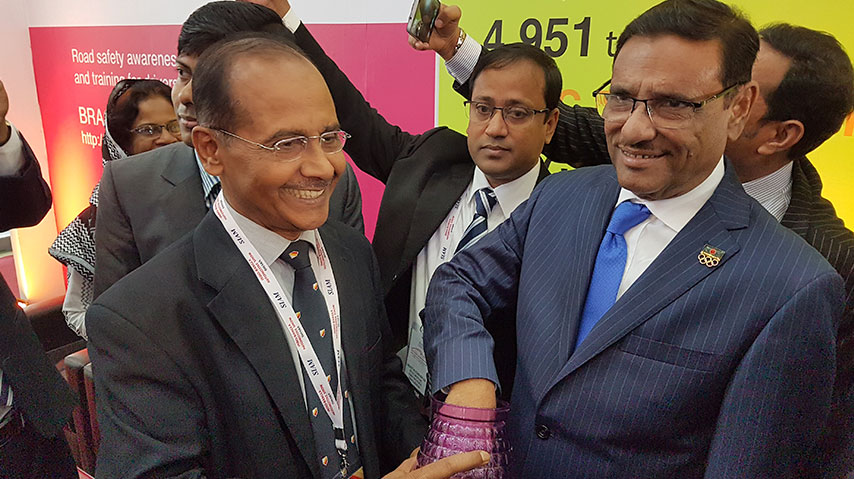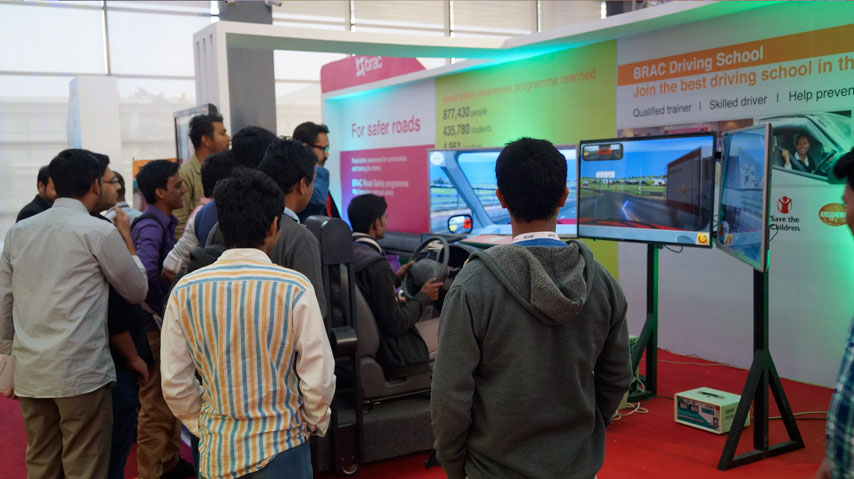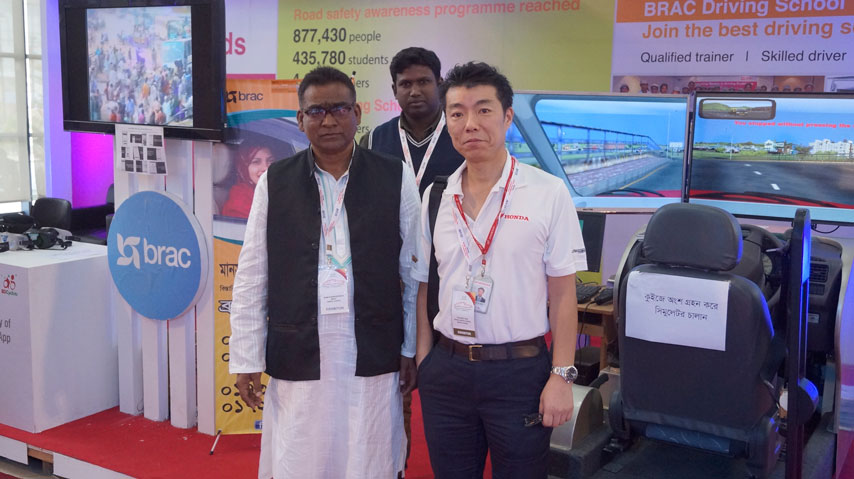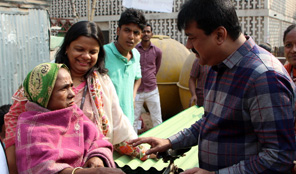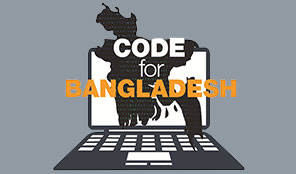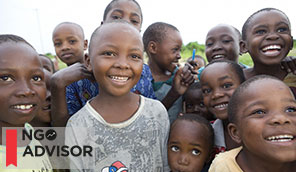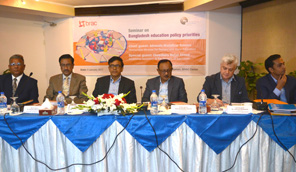
English (961)
Children categories
Removing the Margins: An inclusive approach to Schooling in Pakistan

Despite prolonged and concentrated efforts, Pakistan’s literacy rate lacks behind the global average. Illiteracy is lethal for the development of any country. It is one of the major issues Pakistan is facing since inception. Pakistan has a literacy rate of 58 percent, which has improved from 35 percent in 1990-91, but still way behind the Millennium Development Goals (MDG) targeted at 88 percent, which was to be achieved by the end of 2015. A slight progression in the literacy rate has been noticed with the efforts made by NGOs and the government, but still there is lot more to do.
Illiteracy is a constantly ticking time bomb, just like population explosion, which holds our national development stagnant. Regrettably, we are far away from succeeding in universalizing our basic education system. Several political, economic and cultural factors are hindering our way in attaining a decent literacy rate. The government alone lacks capability and political will of handling such enormous burden. Many organizations, especially NGOs and civil societies, have come to the fore to support government efforts in promoting primary education.
The modern techniques employed by NGOs such as public-private partnerships, family literacy, teacher’s training, and community involvement are yielding good results. The role of NGOs are very clear when comes to education sector, they don’t intend to replace the government, but to ensure the quality standards, affordability and equity in mind are successfully met. However, the partnership between the government and the NGOs has failed to live up to the hopes, as more than 70 percent of the children are still out of the schools in Punjab and the students who go to school are way behind the globally set intellectual standards.
To bring a positive change in the dismal state of education in Pakistan, there’s a need to explore different ways of schooling and education. The community based school system offers a reliable solution to the problem. Community-based education goes beyond the conventional system of cognitive capacities and encompasses the emotional and social aspects of learning. The relationships that children create with the caring adults, in form of the teachers, are the overarching premise of community-based education. Academic experts asserts that the emotional and social development of students comes from the collaborative efforts of parents, schools, and communities.
Recently, I visited some schools of Surjani Town and Saeedabad in Karachi, which are run by BRAC Pakistan (Offshoot of a Bangladesh based NGO). These are non-formal primary schools, which are designed to provide an opportunity to disadvantaged and marginalized children left out of the formal education system due to extreme poverty, displacement, violence or discrimination. The model of this system is unique. It operates on the idea of ‘One room, One School’ model. These schools enroll thirty students of an under-privileged locality, provide them with the school supplies, arrange a teacher from the same area and provide basic primary education. These schools complement the mainstream educational institutes with innovative teaching methods and materials.
So far, 2,097 schools has been established in Sindh and Punjab by BRAC Pakistan, covering total population of four hundred thousand with enrollment of 64,165 children of ultra-poor category in 2016. According to the reports, twenty four million children are out of school in Pakistan, the second highest figure in the world after Nigeria. This figure reflects sorry state of affairs of public education in Pakistan. Government can bring up the literacy rate by involving more NGOs and civil society by expanding the operations and scope of community based education to all the areas of the country.
Creating a community-based education compatible to our socio-cultural needs may seem far-fetched and difficult, but we have examples like BRAC Pakistan who is operating it smoothly with outstanding results. As a nation we have not lost the capacity to envision and meet the needs of our children; we have only suppressed it through misunderstanding the learner of today. We can no longer look at children just as our future. They must become our present. As in the words of Albert Einstein, “no problem can be solved from the same consciousness that created it.”
Faizan Afzal is a freelance journalist and a Young Professional at BRAC in Pakistan. Tweet him @Faizan_Afzal1.
BRAC goes to first ever Indo-Bangla automotive show
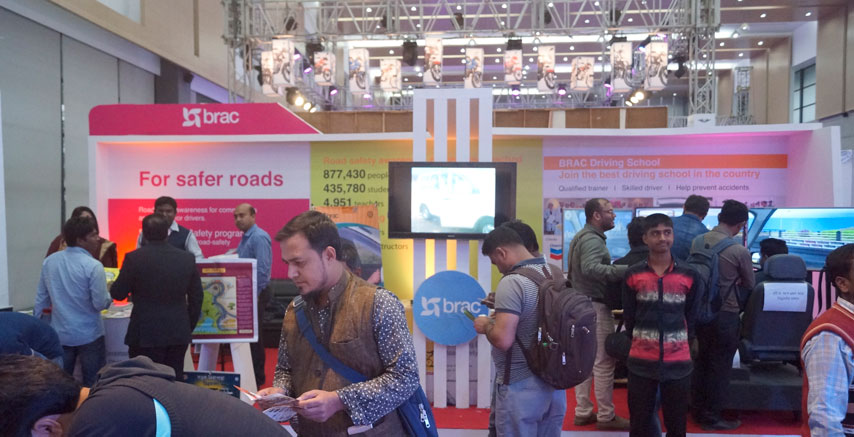
The first ever Indo-Bangla automotive show was held in Dhaka at the International Convention City Bashundhara (ICCB) from 2 - 4 February 2017 where BRAC was the only NGO to be invited as an exhibitor. BRAC's road safety programme and advocacy for social change jointly showcased their road safety interventions such as community road safety programme, BRAC Driving School and the Road Safety Dhaka mobile app. This was a large convention of big names from the automobile industry such as Honda, Yamaha, Maruti, TATA, TVS and Hero to name a few.
|
|
|
|
A photo exhibition on haor and wetlands kicks off
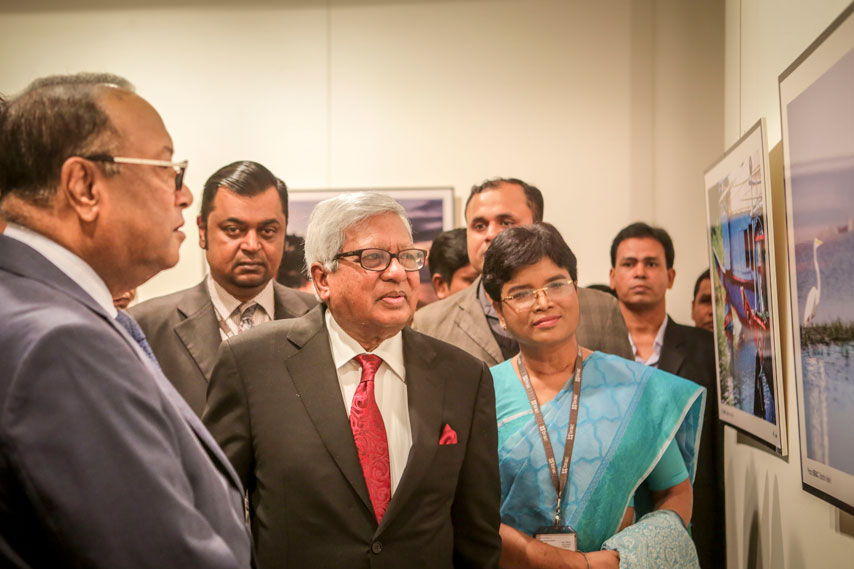
In celebration of the World Wetlands day, the initiative aims to capture the beauty and livelihoods of the people living in haor and wetland areas of Bangladesh
A three-day-long photo exhibition ‘Jol oJoner Golpo’ on the lifestyle and livelihoods of the haor and wetlands in Bangladesh starts from today, 2 February, at the Shilpakala Academy to mark the World Wetlands Day 2017. This year’s theme is wetlands for disaster risk reduction.
Honourable state minister of Water Resources Mr Muhammad Nazrul Islam, Bir Protik, MP and BRAC founder and chairperson Sir Fazle Hasan Abed, KCMG inaugurated the exhibition.
A collaborative initiative of Bangladesh Haor and Wetlands Development under the ministry of Water Resources and BRAC, this exhibition aims to highlight the unique ecological features of haor and wetlands, and the lifestyle and struggles of the people living in this region.
Praising the initiative the state minister Mr Mr Muhammad Nazrul Islam, Bir Protik, MP said, “BRAC’s role in improving lives and livelihoods of the people of haor and wetlands is praiseworthy. But there are scopes for more collaborative work and private-government partnerships in this sector will really make a difference.”
The exhibition is open for all from 2-4 February at Gallery-1 of the Shilpakala Academy. During the inauguration, Sir Fazle said, “Ecology, bio-diversity and the lives of the people living in this region depend on the usage and conservation of the wetlands.
Though Bangladesh succeeded in achieving most of the MDGs, the haor and wetlands have not been able to develop accordingly. BRAC is working in this area along with the government, but it’s still not meeting the demands. Coordination amongst the NGO sector and the government is necessary to improve people’s lives in this region.”
Two days left to register BRACATHON
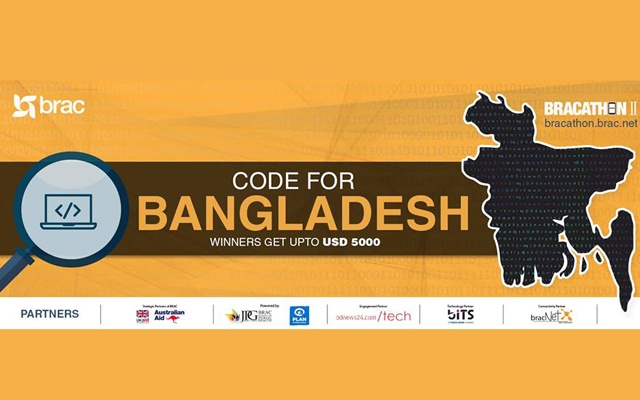
Registration for BRACATHON, the marathon coding competition for social good ends on this Thursday, 2 February 2017.
BRAC's first ever hackathon is a platform for coders to code for social good. Participants will compete to provide useful mobile applications to solve a particular problem. Winners will be decided based on impact, innovation, functionality and quality of the proposal. Interested participants can register by visiting the BRACATHON website bracathon.brac.net.
The 36-hour long Hackathon under the slogan 'Code for Bangladesh' will take place from 17-18 February at BRAC University. The registration started from
The competition will provide funding up to USD 5,000 along with 6-month long implementation and development support for the winners.
BRAC in Rebuilding Saat-tola fire affected area
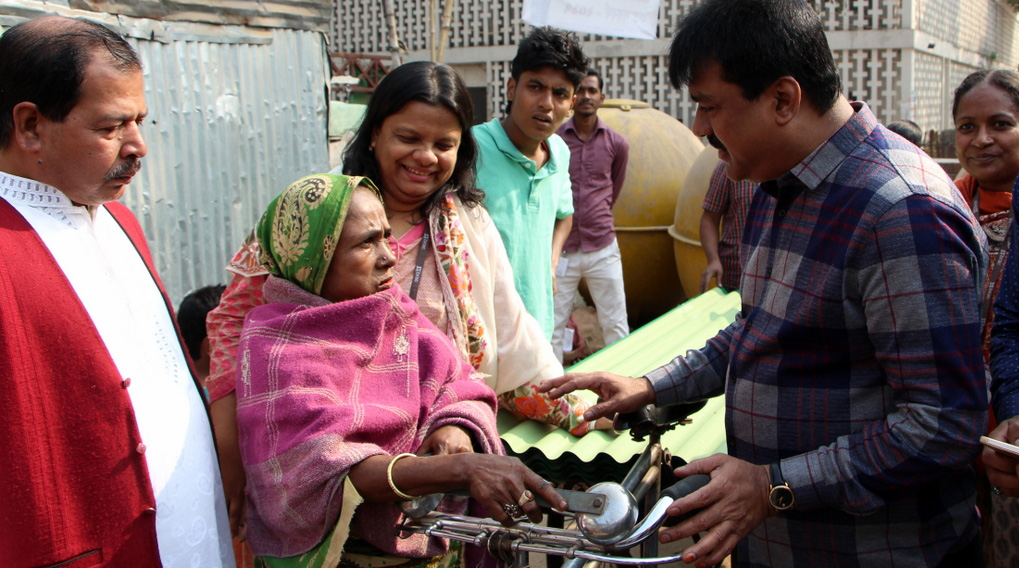
Today on 18 January 2017, BRAC distributed housing materials to the house owners at Saat Tola slum in Mohakhali. 200 bundle of corrugated sheets were distributed among 35 house owners. Wooden posts and bamboo were distributed earlier. These owners own 115 houses all of which were destroyed in a fire at Saat Tola slum on 12 December 2016.
BRAC facilitated agreements between house owners and tenants under which fire-affected tenants will be able to stay at the houses for certain period of time.
The distribution event was led by Hasina Mushrofa, Programme Head, BRAC Urban Development Programme and Md Nasir, Ward 20 Councilor of Dhaka North City Corporation.
Inauguration of Alfalah Primary School in Kabul
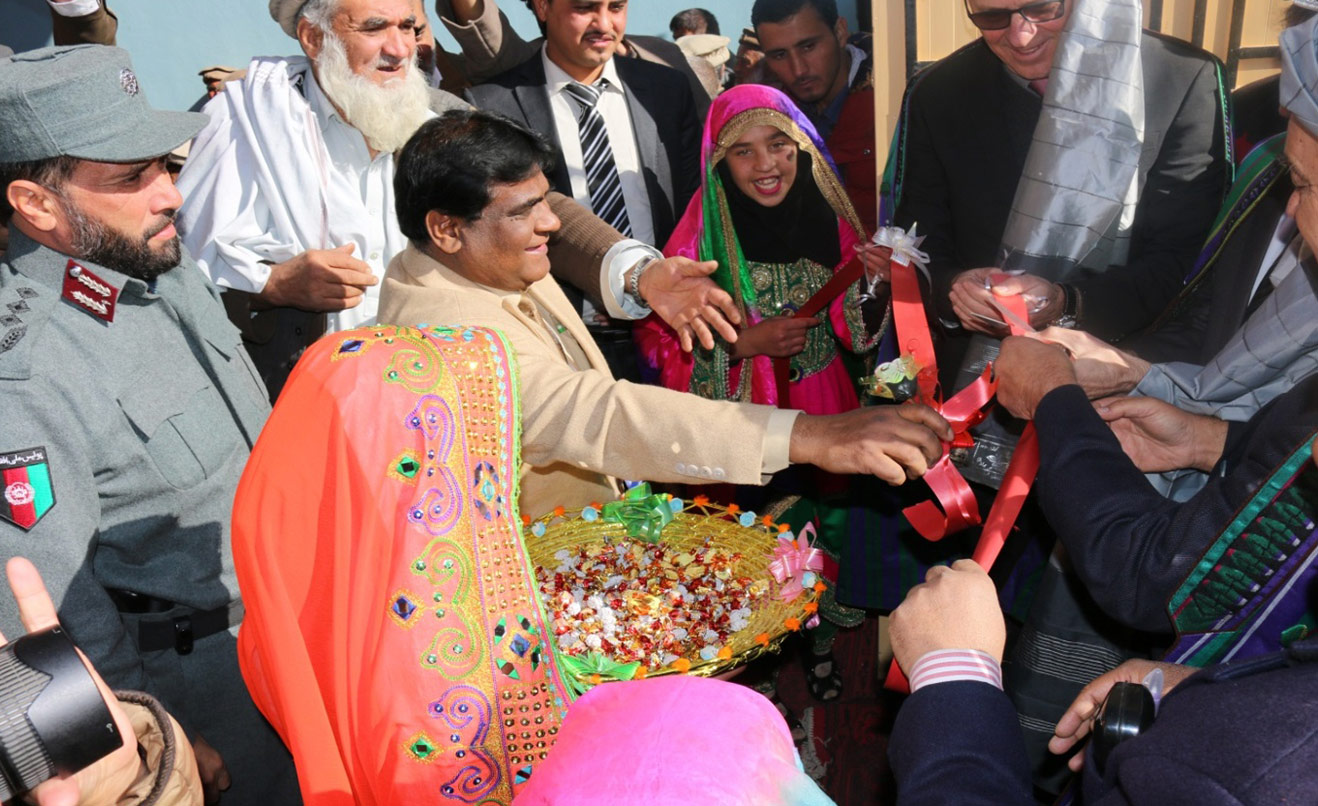
Formal inauguration of the school building through cutting the ribbon by the respective guests
On 28 November 2016, BRAC Afghanistan Education Programme inaugurated a school building in the Paghman district of Kabul Province. It was constructed under community-based girls’ education project in Afghanistan, and funded by Global Affairs Canada.
The new school houses five classrooms for 150 students. It was jointly inaugurated by Dr M Ibrahim Shinwari, deputy minister of General Education from Ministry of Education and by His Excellency Ken Neufeld, Canada’s Ambassador to Afghanistan.

Classrooms visit by the Chief Guests
The construction of the school is a valuable addition to an area that has scarce educational opportunities.
Distinguished guests who attended the inauguration include Hamid Akram, the provincial governor, Dr M Ibrahim Shinwari, the deputy minister, His Excellency Ken Neufeld, Canada’s Ambassador to Afghanistan and Mohammed Shanti, the first secretary of the Canadian embassy in Afghanistan.
The Canadian Ambassador appreciated BRAC’s efforts in the successful implementation of the girls’ education project. He urged the Ministry of Education and local communities to build strong collaborations to promote education for children in Afghanistan.
Registration begins for BRACATHON
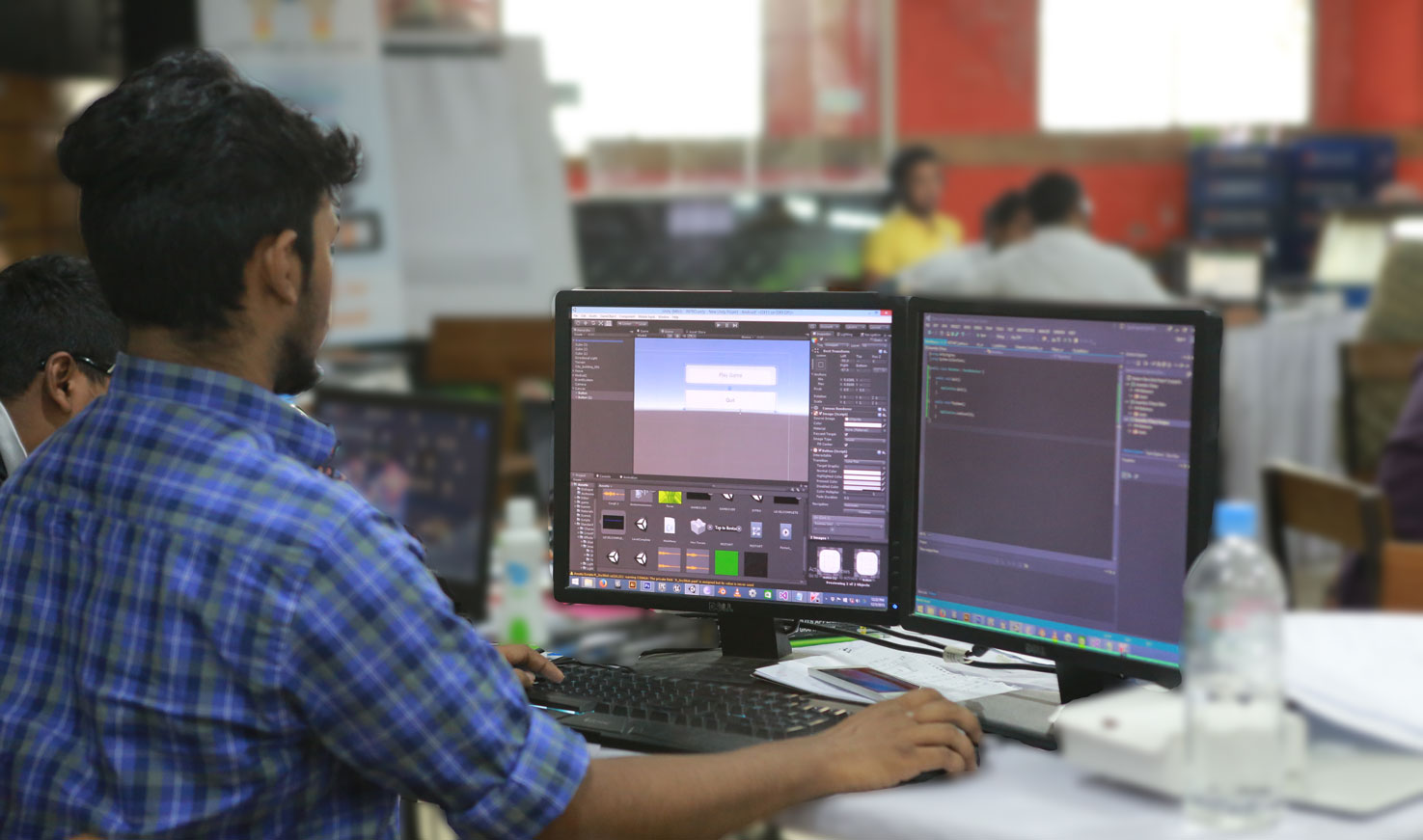
BRACATHON, the marathon coding competition for social good returns for the second year under the slogan 'Code for Bangladesh'. Registrations have opened on 8 January 2017 and will continue until 2 February. The 36-hour long hackathon will take place from 17-18 February at BRAC University.
The competition will provide funding up to USD 5,000 along with 6-month long implementation and development support for the winners. Interested participants can register by visiting the BRACATHON website.
BRACATHON - BRAC's first ever hackathon is a platform for coders to code for social good. BRAC under its initiative to promote technology that contributes to social innovation, created the platform in 2015. Participants will compete to provide useful mobile applications to solve a particular problem. Winners will be decided based on impact, innovation, functionality and quality of the proposal. This year James P Grant School of Public Health, Plan international, biTS, bracnet and bdnews24 have joined as partners to take the competition to the next mile.
View more details here: http://bracathon.brac.net/
Liberia has to work with international private school companies if we want to protect our children’s future

Liberia’s education system is in crisis.
Our communities are still suffering from the effects of the long civil war and the devastating Ebola outbreak. Less than 60% of school-aged children in Liberia are in school, placing Liberia in the lowest percentile of net enrollment rates in the world. Those who do attend school may not fare much better: among adult women who reached fifth grade in Liberia, less than 20% can read a single sentence. Teachers, particularly those in remote areas where there are no banks, sometimes don’t receive their salaries on time and therefore often don’t show up. And it is our children, the future of our nation, who are suffering most.
To not act now would be to fail yet another generation of Liberia’s children.
President Ellen Johnson Sirleaf knows that fixing the education system is a top priority for our country. So, when she appointed me as education minister at the start of 2015, she challenged me to be bold. She asked me to look for innovative education policy options that have the potential to strengthen the public education system in an enduring and sustainable manner. This government is not here to deliver empty promises: our duty is to ensure every child receives a quality education, an education that gives them real chances and choices in life.
My country defeated Ebola with strong political leadership, community engagement, proven good practice and a surge in support from our international partners. To tackle the education crisis, I knew I had to similarly bring together these ingredients, Liberia’s unique assets, in a progressive coalition to improve our schools.
Fact-checking
Any bold policy reform will always be controversial and will attract scrutiny. This was no exception. 12 months ago, I announced Partnership Schools for Liberia and it quickly became a media sensation, with a flurry of coverage in the Liberian and global media. Unfortunately, at the time, and until now, the facts have rarely been reported correctly and ideology has driven the debate.
But with hundreds of thousands of Liberian children enrolled in failing government schools, denied the quality education they deserve, now is not the time to be ideological. Now is the time to be bold, to pilot and experiment and, of course, to rigorously evaluate those pilots before scaling.
The 94-pilot school remain public schools, regulated and quality assured by the government. PSL teachers are civil servants on government payroll, and have every right to be members of teacher associations—Liberian teacher unions. The school buildings remain the property of the government of Liberia. PSL is not privatizing Liberia’s primary schools.
Eight Liberian and international school operators were carefully selected to manage the pilot schools through a ministry-led open and competitive bidding process. Between them they bring education experience from Liberia, West Africa, the wider African region and beyond. These include organizations like BRAC, with vast experience running schools and education programs in Africa and South Asia; Bridge International Academies, which operates more than 400 schools in Kenya, Uganda, Nigeria and India; and Rising Academies, which runs eight schools in neighboring Sierra Leone.

These are organizations that see great value collaborating with the government to deliver better educational outcomes for our children. Any decision to scale or terminate individual PSL operators will be made by the ministry team, based on independent evidence and community feedback. Most importantly, no single organization is or will be getting monopoly rights over Liberia’s primary schools.
Price points
The Ministry of Education has exactly the same financial obligation to the 94 pilot schools as any other public school—around $50 per child per year. PSL operators receive an additional philanthropically-funded subsidy of $50 per child, which enables them to build up the teams, curricula, data systems, among other things they need to run excellent schools.
Ultimately, we expect all operators to run their schools at the government price point, but we know that takes time. We are fortunate to have a group of philanthropic partners who are willing to take on this financial risk in support of the government. At my request, PSL is being rigorously evaluated by a world class research team to provide an independent measure of the effectiveness, equity and sustainability of PSL. The research team works hand-in-hand with the Ministry of Education so we get the data we need to make sensible policy decisions about the future of PSL.
The evaluation is analyzing the impact of PSL across several dimensions, including enrolment, attendance, learning outcomes, equity and parent perception and community engagement. It is a randomized control trial, which will help ensure that differences between PSL and non-PSL schools reflect the true impact of the program rather than any pre-existing differences between the schools. I have been clear from the start that any significant scale up of PSL will be dependent on the results of this evaluation.
This is just one component of Liberia’s progressive education reform platform PSL is an important but by no means the only priority for the Ministry of Education. There is no magic bullet to fix education in Liberia or anywhere, and PSL is just one of a range of reforms we are undertaking to improve our education system. These include plans to reach out-of-school children; the deepening and strengthening of school accountability mechanisms; and an aggressive payroll cleansing program which has already achieved $1.7 million annual savings, no token amount given that my total basic education budget is just $41 million per year.
Within PSL, my task as the education minister is to make sure that the school operators are provided with the conditions they need to deliver, while holding them accountable for their performance. They are required to report regularly on pre-agreed metrics, and their schools are inspected by my team for aspects including child-safe-guarding and quality of teaching and learning.
The public side of a public-private partnership is just as important as the private side. My team is building up the capacity we need to truly be the duty bearer for education: with responsibility for all decisions to commission, scale and indeed terminate operator contracts.
Signs so far are promising. Almost 28,000 children are enrolled in PSL schools, taught by re-invigorated and re-trained government teachers, supported by energized parents and resilient communities. They have the full backing of the Ministry of Education and I am proud of what has been achieved so far.
But these are early days for PSL. While I believe it holds great potential, my team and I are clear that the program will not be scaled significantly until the data shows it works and we have the capacity within government to manage it effectively.
Please challenge and scrutinize the program. We welcome that. But don’t judge PSL on ideological grounds. Judge us on the data—data on whether PSL schools deliver better learning outcomes for children.
The future of hundreds of thousands of Liberian children, their communities and our nation is at stake. We must not fail them.
BRAC ranked number one NGO two years in a row
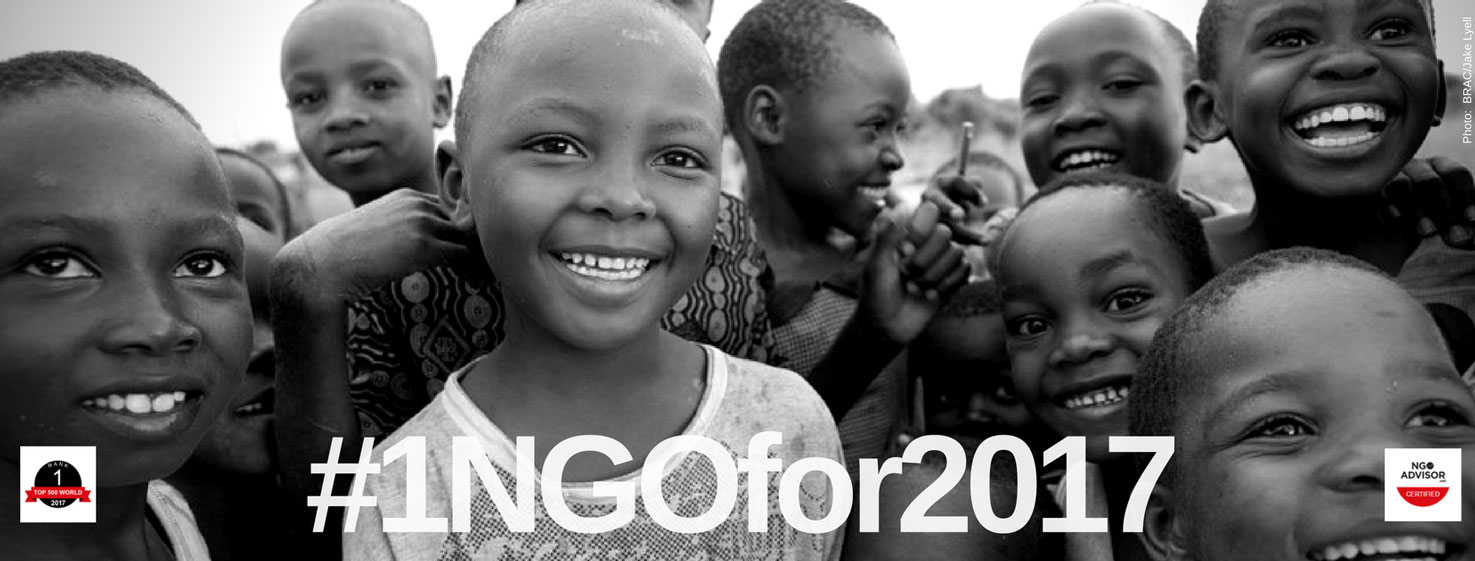
NGO Advisor announced its new list of best NGOs in the world for 2017, and BRAC retained the top spot.
BRAC was ranked the number one NGO in the world for the second consecutive year today by the Geneva-based NGO Advisor, an independent media organisation committed to highlighting innovation, impact and governance in the nonprofit sector. BRAC retained the top spot as part of the 2017 Top 500 NGOs World rankings.
“It is an honour to see that BRAC has retained the number one position once again,” said Sir Fazle Hasan Abed, BRAC’s founder and chairperson. “Every day, more than 100,000 of our staff across the world continue to empower people living in poverty. We are committed, now more than ever, to keep looking for answers to poverty and deprivation – to find out what works and apply the lessons.”
Each year, NGO Advisor researches, evaluates and ranks NGOs from around the world, highlighting the best in their annual Top 500 NGOs World list. NGO Advisor announced the new rankings on its website Monday, January 9. This is the third best-in-class ranking for BRAC in four years.
“Again in 2017, BRAC is the leading organisation in the Top 500 NGOs World rankings, meaning number one in terms of innovation, impact and governance. The agile giant keeps challenging itself to serve more and more communities around the world,” said NGO Advisor Editor-in-Chief Jean-Christophe Nothias in a statement.
In an exclusive interview, Sir Fazle says, “The idea behind BRAC is to change systems of inequity.”
Of more than 500 organisations worldwide, NGO Advisor placed BRAC first in its international category, based on its impact, innovation and sustainability. BRAC was praised for its holistic approach to fighting poverty, treating it as a system of interrelated barriers that must be addressed concurrently. The ranking also highlighted the organisation’s systems-based structure, ensuring sustainability through a variety of revenue streams.
“Pragmatic, adaptive, BRAC can now play any game, whether using for-profit or nonprofit approaches, to face and challenge systems of inequity,” said NGO Advisor in its review of BRAC. “BRAC ticks every box this year, with extra scoring for the clarity of its five-year strategic vision and its willingness to expand its international outreach…Today, BRAC is more than a reference; it is leading the nonprofit world toward its next degree of efficiency and leverage.”
BRAC was founded in Bangladesh in 1972, and today is a global leader in developing cost-effective, evidence-based poverty innovations in extremely poor, conflict-prone and post-disaster settings. These include programs in education, healthcare, microfinance, girls’ empowerment, agriculture, human and legal rights, socially-responsible businesses, a bank, a university, and the world’s largest mobile money platform. In 2016, BRAC employed more than 100,000 people in 11 countries, with a total global expenditure of about $900 million.
BRAC is also unique among the world’s major nonprofits in that its overall budget is majority self-financed. In Bangladesh, where BRAC was founded and the site of its global headquarters, BRAC financed 76% of its $682 million average annual national budget from 2011 to 2015 from its own socially-responsible businesses. However, much of BRAC’s most important work – including its schools, healthcare, ultra-poor graduation programme, climate change resilience, and most of its programmes outside Bangladesh – remains heavily reliant on outside donors.
NGO Advisor combines academic rigour with journalistic integrity and autonomy, evaluating each organisation based upon its objective merits. Co-founded by Jean-Christophe Nothias, a journalist formerly with The Global Journal, the rankings methodology was first developed in 2009.
Nothias has since enlisted experts at The University of Geneva and partners from the nonprofit sector to improve the evaluation metrics used to determine the rankings. Today, NGO Advisor presents its findings to an international audience of donors, volunteers, journalists, researchers, diplomats and nonprofit leaders to showcase best practices and mirror the evolving values of the global community.
The new rankings include several important organisations. The Skoll Foundation, a social entrepreneurship foundation based in Palo Alto, California, claimed the third spot, and Médecins Sans Frontières, also known as Doctors Without Borders, the number two. The Danish Refugee Council and Ashoka rounded out the rankings in the fourth and fifth spot, respectively.
Proper investment in education can yield 19 times the return
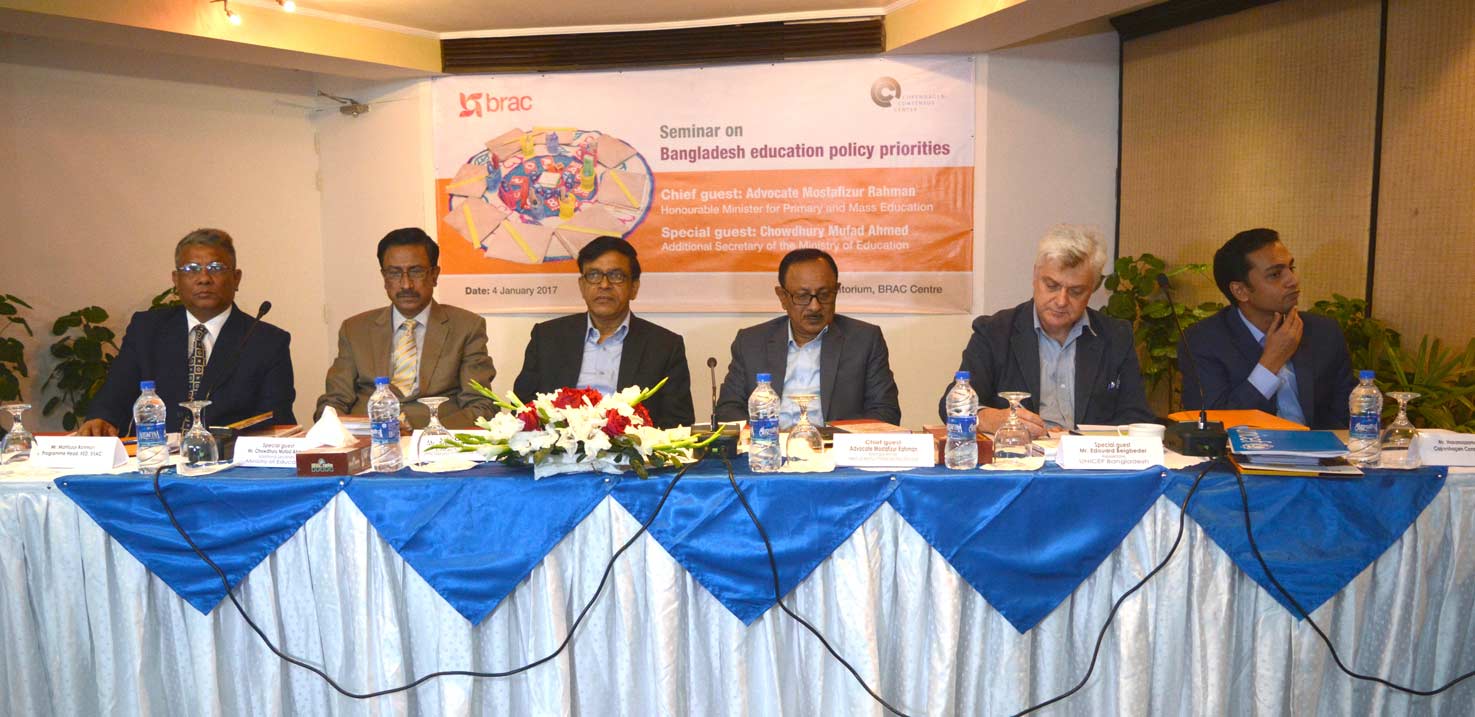
Research shows that there is a significant return on investment made in the education sector. The national budget allocation for the sector, however, remains insufficient. In the pre-primary level, every 1 taka spent leads to a return of 19 taka. This was the primary focus of the seminar ‘Bangladesh education policy priorities’, held on 4 January 2017 at BRAC Centre.
BRAC, together with the international research institute, Copenhagen Consensus Center organised the event to discuss the strategies recommended for realising the Vision 2021 of the Bangladesh government. The minister for primary and mass education, advocate Mustafizur Rahman attended as the chief guest, while the additional secretary of the Ministry of Education, Chowdhury Mufad Ahmed was present as the special guest.
The programme was chaired by the director of BRAC’s education programme, Dr Safiqul Islam. KAM Morshed, director of BRAC’s advocacy for social change, moderated the first session. The keynote speakers at the event were Dr Atonu Rabbani, associate professor, Department of Economics, University of Dhaka; Dr Ahsanuzzaman, assistant professor, Department of Economics, North South University; and Dr S M Hafizur Rahman, professor, Institute of Education and Research, University of Dhaka. Mr Hasnuzzaman Zaman, outreach manager of Copenhagen Consensus Center made the opening statement.
The chief guest, advocate Mustafizur Rahman said, “Bangladesh will prioritise psychosocial stimulation for children and secondary education for girls.”
UNICEF representative, Edouard Beigbbeder said, “I hope the interventions discussed will be taken by the government and we can consider for implementation.”
The second session of the seminar was moderated by Gawher Nayeem Wahra, director of BRAC’s disaster management and climate change programme.
Some of the major challenges raised include the lack of quality education, high dropout rates in secondary schools, not evaluating students based on proper merits, high teacher to student ratio, and lack of accountability of teachers.
Talat Mahmud, director of education, Save the Children, Dr SM Hafisur Rahman, professor at Institute of Education and Research, University of Dhaka, Mohammed Shahidul Islam, education team leader, USAID, and Professor Abdul Bayes, director of BRAC’s research and evaluation division also spoke at the seminar.
Join the world’s biggest family

